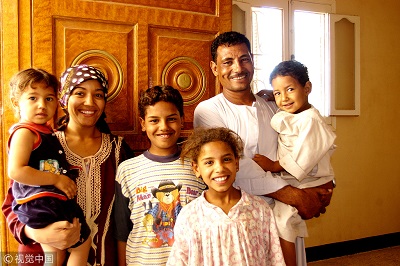


A family in Gurna, Luxor west bank, Egypt. (Photo: VCG)
Cairo (People's Daily) - Egypt's Ministry of Social Solidarity launched on Saturday a national project for birth control to limit overpopulation, dubbed "two are enough", as part of the Takaful and Karama program, according to a statement from the cabinet.
The program, which will be funded through the ministry's NGO support fund and a UN Population Fund grant, aims to curtail the birth rate by specifically targeting around 1.15 million women enrolled in the ministry's Takaful program. The first phase will be implemented in the 10 governorates most in need of family planning services, including Aswan, Luxor, Qena, Sohag, Assiut, Minya, Beni Suef, Fayoum, Giza, and Beheira.
The Egyptian population hit 104.27 million, both domestically and abroad, according to the Central Agency for Public Mobilization and Statistics' (CAPMAS) latest census in 2017. Those living inside the country number 94.8 million, while expats are estimated at 9 million, which is said to grow to 128 million by 2030 if fertility rates of four births per thousand women continue, according to statistics from the Ministry of Foreign Affairs.
"The two biggest dangers Egypt faces throughout its history are terrorism and population growth, and this challenge decreases Egypt's chances of moving forward," the Egyptian President Abdel-Fattah El-Sisi said at the Fourth National Youth Conference last year.
He also said that the population dilemma was a threat to both Egyptians and the government, with each having a role to perform, although the benefits of the appropriate actions would not be immediately visible.
Abu Bakr el-Gendy, the head of Egypt's state statistics bureau which carried out the latest census, described the current rate of population growth as a "catastrophe".
The rate must be at least three times lower than economic growth for people's living standards not to deteriorate, according to Gendy.
Population control is linked to solving the problems of illiteracy, unemployment and poverty.
Wafa Ahmad, a 31-year-old schoolteacher, said she had already decided to have only two children. "My husband, who is an accountant, and I can hardly meet the needs of our family with the nearly 4,000 Egyptian pounds we earn every month," she added.
"Also, it has become difficult these days to find affordable good schools. Meanwhile, prices of other essential items like food and housing constantly go up. Wafa says it's irresponsible to have many children, given the economic conditions in the country.
But some women still want to have more children. "I grew up in a big family and I realize now that I am really happy with that. It becomes a good psychological support system," a young mother said.
"It is important to raise awareness on this matter and persuade families to have two or three children at most," an obstetrics and gynecology professor at Cairo University said. She added that the problem needs to be taken more seriously with constant media campaigns on radio and television to raise awareness on the importance of family planning.
It appears that the government is seeking to develop solutions to curb population growth in Egypt. But limiting population growth in Egypt requires more efficient efforts and cooperation between the government and civil society organizations. So getting this program to get off the ground has a long way to go.
 Fire brigade in Shanghai holds group wedding
Fire brigade in Shanghai holds group wedding Tourists enjoy ice sculptures in Datan Town, north China
Tourists enjoy ice sculptures in Datan Town, north China Sunset scenery of Dayan Pagoda in Xi'an
Sunset scenery of Dayan Pagoda in Xi'an Tourists have fun at scenic spot in Nanlong Town, NW China
Tourists have fun at scenic spot in Nanlong Town, NW China Harbin attracts tourists by making best use of ice in winter
Harbin attracts tourists by making best use of ice in winter In pics: FIS Alpine Ski Women's World Cup Slalom
In pics: FIS Alpine Ski Women's World Cup Slalom Black-necked cranes rest at reservoir in Lhunzhub County, Lhasa
Black-necked cranes rest at reservoir in Lhunzhub County, Lhasa China's FAST telescope will be available to foreign scientists in April
China's FAST telescope will be available to foreign scientists in April "She power" plays indispensable role in poverty alleviation
"She power" plays indispensable role in poverty alleviation Top 10 world news events of People's Daily in 2020
Top 10 world news events of People's Daily in 2020 Top 10 China news events of People's Daily in 2020
Top 10 China news events of People's Daily in 2020 Top 10 media buzzwords of 2020
Top 10 media buzzwords of 2020 Year-ender:10 major tourism stories of 2020
Year-ender:10 major tourism stories of 2020 No interference in Venezuelan issues
No interference in Venezuelan issues
 Biz prepares for trade spat
Biz prepares for trade spat
 Broadcasting Continent
Broadcasting Continent Australia wins Chinese CEOs as US loses
Australia wins Chinese CEOs as US loses